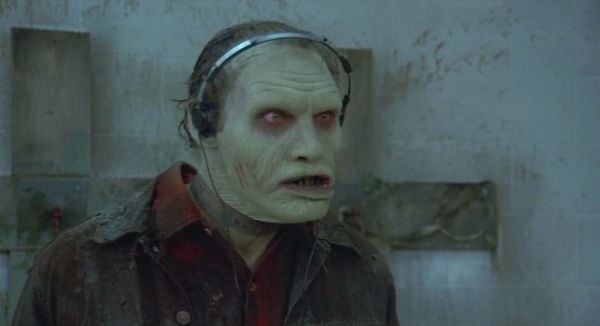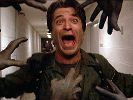Eye For Film >> Movies >> Day Of The Dead (1985) Film Review
Day Of The Dead
Reviewed by: David Graham

A threequel that was largely met with indifference upon its 1985 release - ironically shunned by many zombie-lovers in favour of Dan O'Bannon's fun-filled Romero-referencing Return Of The Living Dead - Day Of The Dead has since been accepted as a fitting follow-up to Dawn Of The Dead and a classic in its own right. Originally envisioned as a much grander epic with armies of trained undead soldiers, it had to be swiftly rewritten when the studios balked at both the gore and budget Romero had in mind. The result is remarkably urgent and coherent given the duress under which it was made, taking a slow-burn approach to its drama but inexorably building towards a breakneck finale that showcases Tom Savini's finest special effects work.
With the zombies now vastly outnumbering the living, a group of scientists have holed up in a disused bunker with a squad of soldiers assigned to protect them. Headstrong Sarah is searching for a way to reverse the re-animation process, while Dr Logan (aka 'Frankenstein') believes the dead can be domesticated, as evidenced by his prize specimen Bub. With communications failing and supplies running out, tensions rise as to where the group's priorities should lie, and the death of the soldiers' leader sees the disgruntled troops attempt to seize power. While a horde of hungry ghouls gather above ground and Frankenstein's captive cadavers wait in the wings, the group battles to see who will escape in a helicopter that can only hold a few of them.

After the more melancholic and intimate moments of Dawn Of The Dead, Day feels charged with friction right from the start, even its sole romantic couple tearing at each other's throats. The opposing factions represent various Reagan-era demographics: blue-collar workers, academics, the pro-war military, and Sarah at the centre, optimistically trying to keep the peace despite near-constant misogynistic threats from men who can't quite keep up with the times. It's a return to the squabbling culture clash dynamic of Night Of The Living Dead as opposed to the close-knit teamwork of Dawn, and the suspense is unduly increased as a result.
Opening in the Florida Everglades, a futile search for survivors in an abandoned town showcases how far Savini's effects have advanced since Dawn, while Romero's EC Comics sensibility and John Harrison's cheesy but rousing score immediately get the audience frothing for the carnage to come. So it's brave of Romero to retreat to an underground lair for the majority of the film, abandoning the initial sense of scope and ramping up the claustrophobia with the tight sets and echoing sound design providing a fetid air of gloom.
As we observe the daily routines of each different group, we see that Sarah is the only adaptable individual, keeping tabs and helping out wherever she can while struggling willfully on with her own research. Romero seems to be compensating for his previously passive female characters, forcing the audience to become fully engaged with Sarah's perspective for the majority of the duration. Lori Cardille makes for a suitably strong lead, with the moments where she does eventually break down proving impressively affecting.
The racial tensions that have always underpinned Romero's writing come bubbling to the surface through Sarah's lover Miguel's frazzled state putting everyone at risk. This gives the soldiers the excuse to abuse her for having an inter-racial relationship, making uncomfortably humorous remarks about how Hispanic people say 'Giallo', in a knowing nod to Dario Argento. Further slurs are slung at the sole black character, and the soldiers' attempts to force him into labor (he's the only one who can fly the chopper) carry obvious echoes to America's history of slavery, especially since he's Afro-Caribbean. Despite the occasionally cartoonish nature of some of these outsiders (particularly the perma-sozzled Irish communications man), all of this shows Romero attempting to represent and address some of the social concerns of his time, albeit in a less succinct and accessible way than in Night or Dawn.
The first two thirds of the film are dominated by charged and lengthy group discussions, where the reason of each individual is clear even if their desperate situation has left them unwilling to listen to each other. In some ways the multiculturalism combines with the threat outside to mirror right-wing America's own concerns about the various races increasingly infiltrating its land; Romero obviously saw it as only a matter of time before the melting pot bubbles over, a theme further explored in his silly but bracing Land Of The Dead.
Of course, all of this thought-provoking build-up is leading to the inevitable zombie showdown, where Romero and Savini really let rip with savage relish. Peppering well-orchestrated jolts and some truly nightmarish imagery throughout the first hour, the director expertly ratchets the tension towards another deliriously exciting climax and it's here that he truly delivers. With the groups divided and corpses closing in on all sides, the gore is soon gushing in gloriously grotty style, all manner of squirm-inducing nastiness befalling the various characters as they scramble to escape. The flesh-eaters are also dispatched in cathartic, crowd-pleasing style, while their scabrous make-up is rivaled only by Fulci's putrescent fiends.
As with the previous installments, Romero finds unexpected pathos amid the carnage, mainly through the re-humanised Bub, brilliantly brought to life by Howard Sherman. Richard Liberty also provides agreeably nutty support as the mad doctor, while Joe Pilato makes for a rip-snorting villain, fully deserving of his iconic grisly fate. Some of the other actors are a little too fond of chewing the scenery, with some dodgy accents proving absolutely cringe-worthy, but for the most part Romero is blessed with a worthy ensemble (eagle-eyed viewers should watch out for Savini protege Greg Nicotero and John 'Martin' Amplas in bit-parts).
It doesn't quite have Night's groundbreaking intensity or the satirical sweep of Dawn, but it's not hard to see why Day Of The Dead has become the trilogy's highlight for some, including Romero. It's rare for such a talky movie to be so exciting, but the wired performances combine with the visceral effects and confident direction to create an utterly absorbing experience, that's also a heap of inventive fun despite its underlying nihilism. Romero may have increasingly tarnished his reputation since, but this is unquestionably indispensable horror from a master of the genre.
Reviewed on: 21 Dec 2012
















